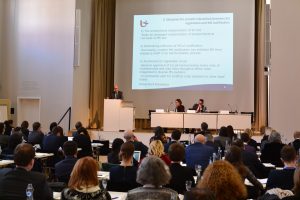The CJEU settles the issue of characterising the surviving spouse’s share of the estate in the context of the Succession Regulation
It has not been yet noted on this blog that the CJEU has recently settled a classic problem of characterisation that has plagued German courts and academics for decades (CJEU, 1 March 2018 – C-558/16, Mahnkopf, ECLI:EU:C:2018:138). The German statutory regime of matrimonial property is a community of accrued gains, i.e. that each spouse keeps its own property, but gains that have been made during the marriage are equalised when the marriage ends, i.e. by a divorce or by the death of one spouse. According to § 1371(1) of the German Civil Code (Bürgerliches Gesetzbuch – BGB), the equalisation of the accrued gains shall be effected by increasing the surviving spouse’s share of the estate on intestacy by one quarter of the estate if the property regime is ended by the death of a spouse; it is irrelevant in this regard whether the spouses have made accrued gains in the individual case. How is this claim to be characterized?
In the course of the German discussion, all solutions had been on the table: some have advocated to classify the issue as a part of succession law only, others have argued for characterising the issue as belonging to the field of matrimonial property law, and a minority opinion has developed a so-called “double characterisation”, i.e accepting the spouse’s share in the estate only if both the applicable succession and matrimonial property law would countenance such a solution. In 2015, the German Federal Court of Justice (Bundesgerichtshof – BGH), ruling on former autonomous choice of law rules, had settled the issue in favour of applying the German conflicts rules on matrimonial property, mainly arguing that § 1371(1) BGB determines what is left to the estate after the gains accrued during the marriage have been equalised (BGHZ 205, 289). The Court argued that, for practical reasons, the means that the provision deploys to allocate the gains are found in succession law, but its function is to deal with the dissolution of a marriage because of the death of one of the spouses. If frictions arose between the law applicable to matrimonial property and the rules governing succession – e.g. a widow receiving nothing although the succession law and the matrimonial property regime would grant her a share if applied in isolation –, such problems would have to be solved by the technique of adaptation.
In light of the Europeanisation of private international law, however, it had become doubtful whether this approach would remain valid within the context of the Succession Regulation (Regulation (EU) No. 650/2012). A pertinent question was referred to the CJEU by the Kammergericht (Higher Regional Court Berlin). Following the conclusions by AG Szpunar, the CJEU now has decided the case in diametrical opposition to the earlier judgment of the BGH, by adopting a purely succession-oriented characterisation. The CJEU argues that “Paragraph 1371(1) of the BGB concerns not the division of assets between spouses but the issue of the rights of the surviving spouse in relation to assets already counted as part of the estate. Accordingly, that provision does not appear to have as its main purpose the allocation of assets or liquidation of the matrimonial property regime, but rather determination of the size of the share of the estate to be allocated to the surviving spouse as against the other heirs. Such a provision therefore principally concerns succession to the estate of the deceased spouse and not the matrimonial property regime. Consequently, a rule of national law such as that at issue in the main proceedings relates to the matter of succession for the purposes of Regulation No 650/2012” (para. 40). The main reason, however, is to ensure that the European Certificate of Succession remains workable in practice by giving a true and comprehensive picture of the surviving spouse’s share in the estate, no matter whether domestic law achieves this result by inheritance law alone or rather by a combination of matrimonial property and succession law (see in particular paras. 42 et seq.). It remains to be seen how much scope this approach will leave to an application of the European Matrimonial Property Regulation (Regulation (EU) No. 2016/1103), which also covers the liquidation of the matrimonial property regime as a result of the death of one of the spouses. Whereas the law applicable to matrimonial property is, in principle, stabilised at the first common habitual domicile of the spouses, the applicable succession law is changed much more easily – it suffices that the deceased spouse had acquired a new habitual residence before his or her death. Thus, an extension of the Succession Regulation to the detriment of the Matrimonial Property Regulation may disappoint legitimate expectations of the surviving spouse concerning the allocation of accrued gains. The CJEU, however, does not seem to worry too much about this aspect, which was not problematic in the case at hand (para. 41). Future cases may be more enlightening in this regard.
 Last weekend, more than a hundred scholars of private international law followed the invitation of Jürgen Basedow, Jan von Hein, Eva-Maria Kieninger, and Giesela Rühl
Last weekend, more than a hundred scholars of private international law followed the invitation of Jürgen Basedow, Jan von Hein, Eva-Maria Kieninger, and Giesela Rühl